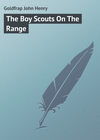Buch lesen: «The Boy Aviators' Flight for a Fortune», Seite 6
CHAPTER XIII. – A TWENTIETH-CENTURY RESCUE
As he flew his craft in the direction of the feeble beacon of distress, Dr. Perkins once more switched on the searchlight. Its comforting beam shot across the sea, and finally ceased its swaying and centered on a strange sight. As a dark scene in a theater is illumined at one single point by the calcium light, so the search rays concentrated themselves on a striking picture of distress at sea.
Framed in the circle of white light the boys could see a small gasolene craft, apparently up to the rails in the water. At any rate nothing of the hull but a narrow white strip could be seen, while, on the top of the raised deck cabin crouched the figures of three men. One of these had been swinging the lantern, but he ceased as the bright light from the Sea Eagle bathed the group in its rays. One single mast arose high above the pitching hull, and from it could be seen wires strung down to the cabin top. Evidently this was the wireless apparatus which had been the means of bringing the Boy Aviators and their friend to the rescue.
The yacht could not have been more than fifty feet in length – a very small craft to be equipped with wireless; but her owner, if he was on board, must have been congratulating himself at that very moment on his wise precaution.
It was but a few minutes after the searchlight had first revealed the Wanderer and her distressed company that the Sea Eagle was swinging in a graceful, birdlike circle in the air above the sinking craft.
Frank seized up a small megaphone, which formed part of the sea and sky ship’s equipment.
“Ahoy! Aboard the yacht!” he cried.
“Ahoy!” came back the cry, with a note of incredulous wonder in it, as well there might be, considering the extraordinary circumstances.
“Are you the folks we talked with by wireless?” called Harry.
“The very same,” was the shouted reply, “but who are you? Can you get us off this? The ship won’t last much longer.”
“We’ll get you off all right,” exclaimed Frank comfortingly, and as he spoke Dr. Perkins allowed the Sea Eagle to glide down to the surface of the waves, alighting on the water about five hundred feet from the castaways. He at once headed the Sea Eagle round, and calling for reduced speed made for the sinking yacht.
“Slow down! Stop her! Reverse!” he shouted in rapid succession, as they bore down.
“On board the yacht!” hailed Frank, as they glided up alongside, “throw us a line.”
The desired rope came snaking through the air, falling across the Sea Eagle’s bow. Harry bounded forward and made it fast.
“Now haul in,” ordered Dr. Perkins, as soon as the propellers had ceased to beat the air; “easy now; we don’t want to foul the wings.”
His order was obeyed; and before long the Sea Eagle’s bow was scraping the side of the Wanderer. Fortunately, the sea was smooth, or the maneuver would have been impossible of execution. As it was, however, on the easy swell that was running it was made with comparatively small difficulty.
“Well, great Cæsar’s ghost!” blurted out a stout, blond man in yachting costume, who occupied, apparently, the position of owner of the yacht, “if this isn’t the twentieth century with a vengeance. Just think of it, Griggs – rescued by an aëroplane!”
The man addressed, a good-natured-looking man, almost as corpulent as the first speaker, nodded appreciatively.
“We don’t really know how to thank you folks,” continued the stout man; “we haven’t much longer to stay above water, as you see. We hit a derelict at dusk, and stove in our port bow. The water came rushing in so fast that I had barely time to flash that wireless that you so providentially caught.”
“It was feeble enough, I can tell you,” Frank assured him; “fortunately, we were not far off, and so managed to catch your appeal for help.”
The stout man was again warmly thanking his rescuers, when Dr. Perkins interrupted.
“Suppose you come on board,” he said; “by the looks of your craft she is likely to take a plunge at any minute. I’d like to be able to cut loose from her before that happens.”
Taking this hint, the stout man clambered on board the Sea Eagle with more agility than might have been expected from a man of his heavy build. This done he extended a hand to his friend, and then came the turn of the third occupant of the cabin roof to disembark. This third man was evidently, from his costume, a paid hand on board the Sea Eagle. He was slight and dark and foreign looking, with beady black eyes, and a not over-prominent chin.
Directly all were on board, Dr. Perkins ordered Frank to “cast off” from the sinking yacht. It was well this order was obeyed promptly, for hardly had the Sea Eagle been disengaged from the other craft’s side, than the Wanderer gave a sudden plunge, bow downward, under the waves. For one instant her stern upreared itself vertically, showing the rudder and propeller, and then, as if by magic, the whole craft vanished, to find a grave in the ocean bed.
All this was seen by the searchlight, which Dr. Perkins had kept concentrated on the yacht while the last act of this ocean drama was being consummated. As the yacht vanished a deep sigh broke from the stout man.
“Good-by, poor old Wanderer,” he said, “there’s an end of this cruise.”
“I am sorry that she was not in a condition to tow to Brig Island,” remarked Dr. Perkins.
“My dear sir, so far as the actual monetary loss is concerned it was fully covered by insurance,” responded the stout man; “my only regret is to see a craft I was very fond of end her days in such a fashion. Also, I am afraid my friend Griggs here will be disappointed at the failure of our cruise.”
“Good heavens!” cried Mr. Griggs, who appeared to be a highly nervous individual, “I’m glad to have my life, Sterrett – glad to have my life. If I don’t catch my death of cold over this I’ll be fortunate indeed.”
“In the meantime,” struck in the man addressed as Sterrett, “we are forgetting in our own troubles the debt of gratitude we owe to our friends here. In the first place, let me introduce ourselves. I am Paul Sterrett, late owner of the Wanderer. This is my friend, Samuel Griggs, and yonder,” indicating the foreign-looking third man, “is Francis Le Blanc, our cook and general handy man. We left New York on a cruise up the coast sometime ago, and up till to-night experienced no mishaps. However, as my friend says, we must not repine; we should consider ourselves fortunate indeed to be onboard your remarkable craft instead of being in a watery grave, as we must have been had it not been for your opportune arrival.”
“We consider ourselves fortunate to have been of service to you,” responded the inventor, and then went on in his turn to introduce himself and his party, and also give a brief explanation of the Sea Eagle, which had, as may be imagined, excited the liveliest curiosity on the part of the rescued castaways.
“But as we shall now get under way without further loss of time,” he concluded, “you will be able to see for yourselves just how the Sea Eagle is controlled, and what she can do.”
As he finished this speech, Dr. Perkins extinguished the searchlight, which had still been playing on the oil-streaked waters which marked the burial spot of the ill-fated Wanderer. This done, he gave Frank the “come ahead” signal. Obediently, as usual, the motor began its song, and the propellers took up the whirring, buzzing refrain. Mr. Sterrett and his companions sat perfectly still in the positions in the stern which had been assigned to them. Had it been light enough to read the expressions on their faces one would have said that they were absolutely dumbfounded.
Of course both Mr. Sterrett and his friends – as well informed men – knew the wonderful capabilities of the modern aëroplane. They had witnessed many flights, and in common with the generality of progressive Americans, knew the general principles of aërial locomotion. But when the Sea Eagle from a “boat” turned suddenly into a hydroplane, they exchanged swift expressions of the utmost astonishment. Only their companion, the paid “hand” from the yacht, sat sullenly unimpressed. In fact, since he had boarded the Sea Eagle, he had not uttered a syllable, only mumbling his thanks when Mr. Sterrett and his companion had finished expressing their gratitude for their rescue.
Under the skillful guidance of Dr. Perkins, and the constant attention that Frank paid to the whirring motor, the Sea Eagle made a quick run back to the island, being guided, when she was still some distance away, by the ruddy glare of a big beacon fire lighted by Ben Stubbs. It was an instance of the veteran adventurer’s thoughtfulness and resource that he had thought of doing this, for in the hurry of the departure, no such instructions had been given him. But on his own responsibility he had kindled the blaze which materially aided the swift return of the Sea Eagle to her eyrie.
Reaching the island, the aërial wonder was sent swinging in decreasing circles, till Dr. Perkins was sure of a safe drop to the workshop on the summit of the little spot of land, and then, with a breath-catching rapidity, the helmsman sent his wonderful vessel earthward, bringing it to a stop within the ruddy glow caused by the blazing bonfire which had guided them.
As the Sea Eagle settled to the earth the party that had been left behind on the adventurous night flight pressed to the side of the novel craft. A glance showed them that the mission of Dr. Perkins’ craft had been crowned with success, and Billy and Pudge began plying the returned voyagers with eager questions. Ben Stubbs was slightly in the background, and it was not till Mr. Sterrett and his companions had stepped out on to the ground that he got a good look at them.
When he did, he gave a deep-drawn gasp of surprise. An expression of supreme amazement overspread his weather-beaten countenance. But his eyes did not fix on Mr. Sterrett or his companion, Griggs. Instead they traveled beyond the nattily clad yachtsmen and rested on the slim figure of the paid “hand.”
“Raoul Duval, as sure as there’s a north star!” choked out Ben, half to himself, “waal, if this ain’t a small bit of a world!”
CHAPTER XIV. – BEN’S PLAN STOLEN
For his part Duval was no less quick in recognizing Ben Stubbs. At the moment, Dr. Perkins and the rest were standing in a group a little apart, and discussing their adventure, while Mr. Sterrett was loud in his praises of the Sea Eagle, which he described as the most wonderful craft on earth. Giving a swift look round to see that he was unobserved, Duval pressed a finger to his lips to enjoin silence on Ben, and then beckoned him to come a short distance out of the firelight.
Ben, in wonderment as to this unexpected reappearance of the young man who had exercised such sharp practice on him, obeyed the summons. But when he addressed Duval it was in an angry tone.
“What’s this mean,” he exclaimed, “how did you come here?”
“As you see, by that air ship,” was the reply; “I never expected to see you here, however. I tell you, Stubbs, I’ve had a lot of hard luck. When those boys and that professor-chap rescued us I had been compelled to ship as a deckhand and cook on that yacht. Just think of it.”
“A mighty good thing for you, say I,” grunted Ben brusquely, “a little good, honest, hard work will take some of the crooked kinks out of your brain. My recommendation to you, Duval, is to stick to that sort of a job, and in time you’ll learn to be a man.”
Duval shot a look full of malice at the blunt old fellow. But his face was in the shadow, and Ben did not notice it. Instead he continued:
“But I ain’t the one to bear a grudge, Duval, although you did come mighty near shipwrecking my faith in human natur’. Shake hands, mate, and for your old father’s sake I’ll do what I can fer you. I ain’t one to kick a man when he’s down.”
Duval extended his thin, long-fingered hand, and Ben seized it in his rough paw and shook it with a heartiness that made the dark-skinned Duval flinch.
“There!” exclaimed the old fellow heartily, as he relinquished his grip, “that’s all ship-shape and in good trim. Now let’s get back to the rest of ’em afore they see us talking apart.”
“You’re not going to give me away to them?” asked Duval, almost breathlessly. “Sterrett thinks I’m all right, and may give me a better job some time.”
“I won’t stand in your way, lad,” heartily rejoined Ben. “In fact, I’d like to help you get on your feet again.”
“How about that plan of the location of the Belle of New Orleans?” asked Duval, without paying any attention to Ben’s last remarks.
“Safe enough in my pocket, mate,” replied Ben, tapping his worn coat; “why do you want to know?”
“I wondered if you had investigated my story.”
“No, I haven’t yet; but I don’t mind telling you that I may do so before very long. And I’ll tell you right now, Duval, that if we recover anything valuable from that wreck I’ll see to it that you get a good share of it, and then you can set up in business again and make a new start.”
Duval expressed what appeared to be very deep thanks for Ben’s generosity. But, in reality, his thoughts were busy elsewhere. An idea had come into his head that was to bear strange fruit before very long. They joined the group clustered about Dr. Perkins without their absence having been noticed. Billy and Pudge had seen to it while the Sea Eagle was on her mission of rescue that a good hot lunch should be ready on the return of the expedition. A few moments after Ben and Duval joined the others Pudge announced this fact, and the party trooped into the hut, nothing loath, to fall to with hearty appetites on a good meal. Soon after they “turned in,” the boys insisting on the strangers taking their bunks, while they and Ben Stubbs put up with “shake-downs” on the floor.
It was very late – or rather early morning – when they retired, and before long all were wrapped in the deep sleep of exhaustion. Ben was the first to awaken, to find the sun streaming into the hut.
“Great guns!” he exclaimed, glancing at Billy’s alarm clock on a shelf, “it’s after seven.”
Broad awake in a jiffy, he aroused the others, going from the floor sleepers to the bunks. Dr. Perkins, Mr. Sterrett and the latter’s friend were awakened in turn, and it was not till then that Ben noticed that Duval’s bunk was empty.
“Good fer him,” he said to himself warmly, “the young chap has started to turn over a new leaf by gittin’ out early. I’ll take a turn outside afore breakfast and see if I can find him.”
But Duval was not about the workshop, nor did Ben’s calls summon him to breakfast. It was not till that instant that an ugly suspicion flashed into Ben’s hitherto unsuspecting mind. Without saying a word to the others he hastily drew out his wallet and, withdrawing to a corner of the hut, examined its contents. Instantly his suspicions were verified.
The plan of the location of the wreck of the Belle of New Orleans was missing!
Stifling his anger as well as he could, Ben hastened to the beach. As he had suspected the moment he found the plan missing, the small skiff was gone. What had happened was as plain as print to Ben now. Young Duval had waited till all in the hut were asleep, then he had stealthily crept from his bunk, recovered the plan he had given to Ben, and had decamped in the small boat.
“Waal, the dern scallywag!” burst out Ben, as he stood on the beach in the first shock of his discovery.
In his anger he shook his fist at the strip of sea between the island and the mainland to which, he did not doubt, Duval had crossed in his flight.
“The – the – precious scamp!” he continued, his bronzed features working, “and I trusted him as I would have trusted his dad.”
Shaking his head, Ben slowly made his way from the beach back to the hut. He said nothing of his discovery during breakfast, but after the meal he found a pretext for drawing Dr. Perkins to one side. To him he communicated what had occurred.
“A good riddance of bad rubbish,” said Dr. Perkins when Ben, whose voice shook with anger, had concluded his story; “we are cheaply rid of him, Ben.”
The inventor, while not a selfish man, was so wrapped up in the success of the Sea Eagle that, to him, the loss of the plan of the wreck did not appeal in the same way that it did to Ben Stubbs. But the old adventurer took him up indignantly.
“Bad rubbish, as you say, sir,” he grated out, “but if that paper hadn’t bin worth something Duval wouldn’t have taken it. It’s good-by to recovering that stuff from the Belle of New Orleans now.”
“By Jove! I’d quite forgotten my promise to you,” said Dr. Perkins contritely; “but never fear, Ben, I’ll see that you are not a loser.”
“It ain’t that,” rejoined Ben; “I don’t give a snap for the plan; but it’s the ingratitood of that young whippersnapper that’s got me sore. I’d like – I’d like to find that wreck just to get ahead of him.”
“Humph!” rejoined the inventor, “I understand your feelings. He has certainly treated you very badly. But possibly we can think up some way to outgeneral him.”
“Don’t see how we are goin’ to do it without that plan,” rejoined Ben; “but I ain’t one to cry over spilt milk. It’s gone, and that’s all there is to it. The best thing to do is to forget it.”
Frank and Harry, on their way to the Sea Eagle’s shelter, were passing at the moment. After asking the inventor if he thought it would be advisable, and receiving an affirmative reply, Ben called them over. As briefly as he could he told them what had happened.
“Well, the precious rascal!” broke out Frank; “I thought there was something snaky-looking about the chap last night. Isn’t there a chance of catching him?”
“Not such a slick rascal as he is, Frank,” rejoined Ben despondently; “no, the plan is gone, and gone for good – so good-by to that.”
But Harry now spoke up, and to the astonishment of the others his voice did not hold a trace of the disappointment they could not help but feel.
“Cheer up, Ben,” he said heartily, “and by the way you might just cast your eye over this and see if it looks familiar.”
As he spoke he dipped a hand into his breast pocket and produced a folded paper. Ben, with a mystified expression, took it and opened the thing up. The next instant it almost fell from his hands.
“Why! – why, by the glittering Pole Star!” he choked out, “it’s the plan itself!”
“Not exactly,” laughed Harry, “but I think it’s a pretty good copy. You see I always liked drawing and that sort of thing, so when you showed me that plan I memorized it, and when I got a chance I sketched out this copy in case anything happened to the original. I think it’s good enough to take a chance on.”
“Good enough!” roared Ben, “why, lad, it’s the plan itself. Now, then, if we don’t beat Master Duval to the Belle of New Orleans call me a double-decked, lee-scuppered sea cook!”
CHAPTER XV. – WHAT HAPPENED ASHORE
As Ben had surmised, Duval had waited till the boys and their friends were sound asleep, and had then, in accordance with a plan he had thought of the instant he set eyes on his kind-hearted friend, sneaked out of his bunk and, tip-toeing softly to Ben’s clothes, located the wallet and with small trouble or loss of time abstracted the plan of the lost wreck. During the evening the ingrate had heard a description of the island given to Mr. Sterrett by Dr. Perkins, so that after taking the plan he left the hut and made for the beach by the path through the woods.
Shoving off the skiff, he had taken up the oars and started rowing as fast as he could for the mainland. But what with the darkness and his unfamiliarity with that part of the coast, he had failed to land in the cove adjoining the fisher village of Motthaven, and had beached his craft a considerable distance to the south of the place. It was just growing light when the bow of the skiff grated on the sand, and Duval hastily scrambled out and started off. His object was to find a railroad station and travel as far as his scant supply of money would take him from the vicinity of Brig Island.
After that his plans were still vague; but he had an indefinite idea of getting to New York or some large town, and interesting anybody with capital to finance an expedition for the recovery of the gold dust chest and the bag of black pearls that lay at the bottom of the Black Bayou amid the moldering timbers of the lost steamer. The utter depravity and black-heartedness of this plan, and his base ingratitude to the man who had aided him in every way, did not strike him. Instead, there was but one over-mastering thought in his mind, and that was to secure whatever treasure might be in the wreck as quickly as possible, and then vanish from America for some foreign country with his ill-gotten wealth.
Busy with such thoughts as these, he hastened up the beach in the gray of the dawn, and finding a rough sort of path leading up the low cliff that overhung the beach, he started to ascend it. He had not gone more than a few paces, however, before he saw, buried back in some trees, a rough-looking hut.
Duval was hungry and thirsty, and, moreover, his long row, at such a feverish pace, had exhausted him. Determining to tell a story that would account for his presence in that isolated part of the coast at such an early hour, he made up his mind to apply at the hut for some refreshment. His story was to be that he had set off on a fishing expedition and had lost his way and been wandering all night.
“Probably only some fool fisherman lives there who will believe anything I choose to tell him,” he thought; “these fellows are all as thick as mud, anyhow.”
Musing to himself in this fashion, the renegade fellow made his way toward the hut and, coming to the door, knocked loudly on it. But there was no answer, and when, after repeated knockings, he could elicit no response, Duval determined that, as there appeared to be nobody at home, he would walk in uninvited and see what he could “forage” for himself.
The door was unlocked; in fact, it had no latch and hung crazily on its rusty hinges. Opening it, Duval found himself in an interior as rough and uncouth as the outside of the hut had promised. A table made of old planks, seemingly flotsam from the beach, two soap boxes for chairs, and a rough sort of bunk, or rather shelf, littered with a pile of dirty old blankets, made up the furnishings. On the table were the remains of a meal, which had consisted apparently of roasted lobsters and fish. Two tin cups and tin plates, with battered knives and forks beside them, completed the table service.
“Confound it all,” muttered Duval, “whoever lives here is as poor as a church mouse. Some miserable fisherman, I suppose, who has hardly enough to keep body and soul together.”
He walked to a corner of the shack where there was a sort of cupboard contrived out of old boxes. He had guessed that this formed the pantry of the establishment. Sure enough, in it he found a loaf half consumed, and the remains of a roasted lobster, as well as some scraps of fish. He was too hungry to be particular and was just about to start eating when a quick step behind him caused him to start violently, dropping the food he had in his hand.
But before he could utter a word the young man – or, rather, loutish boy – who had entered so quietly, owing to his being barefooted, stepped up to him and, raising a heavy oar he carried, dealt the intruder a blow that deprived him of his senses for the time being.
As Duval fell to the floor a man in rough fisherman’s garb, with a wrinkled, mahogany-tinged face and a tuft of gray whisker on his prominent chin, entered.
“Why, Zeb, what’s up?” he exclaimed, in an astonished voice.
“I found this feller snoopin’ about in here, pop,” was the rejoinder, “an’ I calkelated ter lay him out till we could find out what his business was.”
“Good ernuff, boy,” responded the elder Daniels, for most of our readers must be aware by this time of the identity of the two newcomers; “but who do yer suppose he is? He’s dressed like one of them fancy sailors off’n a yacht.”
“Dad, I figger he’s a detective sent here by them kids on Brig Island. That’s the way it looks to me.”
“I guess you’re right, Zeb. Here, give me a hand to get him up on the bunk. By hickory, but you must have hit him a clip.”
“Reckon I did land kind er hard on him, dad, but I wasn’t takin’ chances of his turning on me.”
The two worthies lifted Duval’s limp form and laid it, not over-gently, on the tumbled pile of frowsy blankets. This done, a sudden thought struck the elder Daniels.
“Calkerlate I’ll take a look through his pockets,” he said; “might rummage out something worth havin’.”
Zeb helped his father in this task; but aside from a small sum of money, and a collection of worthless odds and ends, they found nothing that appeared to them to be of importance. In an inner pocket Zeb came across the stolen map. Much mystified, he showed it to his father.
“What do you think this kin be, pop?” he inquired.
The old man took it and knitted his brow over the document in a puzzled fashion.
“By hickory, I kain’t make it out,” he confessed; “thar’s some riting in ther corner, though. Spell it out, Zeb.”
Zeb, obediently, but somewhat laboriously, read out:
“‘Map of the location of the wreck of the Belle of New Orleans.’ That’s what it says; but what does it mean?”
“That’s plain enough, ain’t it?” retorted the old man. “It’s a map of some wreck or other, but what does this feller want with it? That’s the question.”
“Better ask him. He’s opening his eyes and coming to.”
Sure enough Duval stirred uneasily, and threw up his hand as if to ward off a blow.
“Don’t hit me, Frank Chester,” he cried out; “I’ll give back the plan I stole.”
“Oh-ho! That’s the way the wind blows, is it?” muttered the elder Daniels, and then, addressing Duval, who was now staring wildly about him, he said:
“So you come from Brig Island, eh, my hearty?”
“Yes; but how did I get here? Oh, I remember now. I was looking for food and somebody struck me.”
“That was me, I reckon,” grinned Zeb, “who are you, anyhow? Did those kids on Brig Island send you here after us?”
What with the effects of his blow, and his alarm at his position, Duval lost his customary caution.
“I’m no friend of anybody on Brig Island,” he exclaimed, “but what do you know about that place, anyhow?”
“A whole lot,” grimly rejoined the elder Daniels; “now, see here, my lad, you’d best make a clean breast of it. How did you come by this plan?”
The old fisherman, who was pretty keen-minded, had guessed by Duval’s guilty manner that there was some mystery connected with the document which he now flourished.
Duval sat up on the bunk and pleaded for the return of the plan; but to no avail.
“I’m smart enough to see through a wall when there’s a hole in it,” said old Daniels; “now, see here, I reckon you ain’t no friend of them kids on the island?”
Duval shook his head. He had, of course, no reason to dislike the boys; but he was an arrant coward at heart, and saw that the men in whose power he was, hated the young dwellers on Brig Island. He therefore thought it good policy to affect to be of their way of thinking.
“I’m no friend of theirs,” he said, rather sullenly, “but what’s that to you?”
“May be a whole lot, if this plan is what I think it is. Now I’ve a pretty good idea that you come by it in no very honest way. Ain’t that so?”
“I – I was given it,” stammered Duval uneasily, while Zenas’ little gimlet-like gray eyes bored him through.
“That’s a lie,” rejoined Daniels easily; “come on, out with the truth, now. It won’t do you no harm, and may keep you from the constables.”
This was a shrewd move on Daniels’ part. Duval’s eyes dilated with fear at the idea of coming within the reach of the law. Without more ado he blurted out part of the story of the lost Belle of New Orleans, and offered to let Zenas share in the prize if he should locate it. While Duval was talking the elder Daniels had leaned forward, consumed with interest. Avaricious to a degree, the thought of the sunken treasure made him fairly burn with desire to gain it.
“You’re sure that was a true story that feller give you?” he asked, as Duval concluded his story.
“I’m certain of it. I know for a fact that my father had a lot of gold dust and those black pearls with him on his last voyage, for he had written home about the fortune that he was bringing.”
“Humph! Waal, your story sounds all right, and I don’t know but what you’ve come to the right shop to get some one to help you get at the wreck. I’ve got a diving outfit and a little money, and I kin raise some more. Now sit down and Zeb will get you a bite to eat, and we’ll talk things over.”
And thus was begun an alliance which was to prove a source of much trouble to the Boy Aviators and their friends in the near future.




















